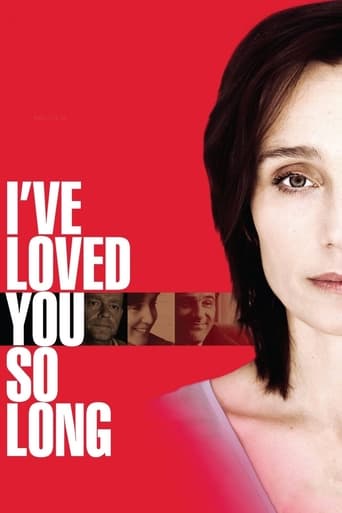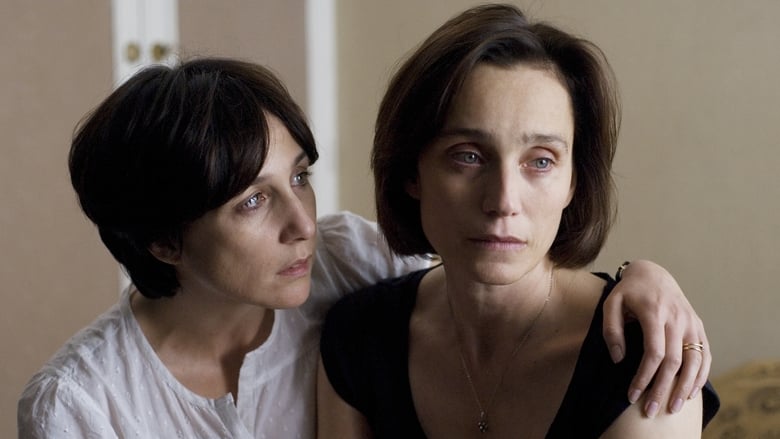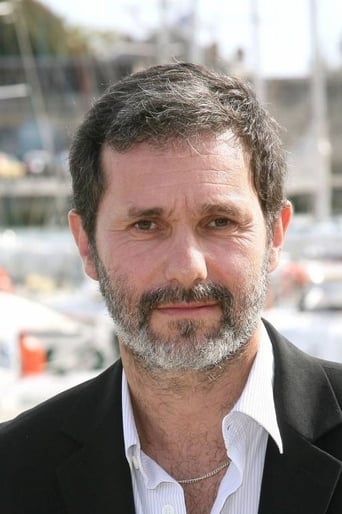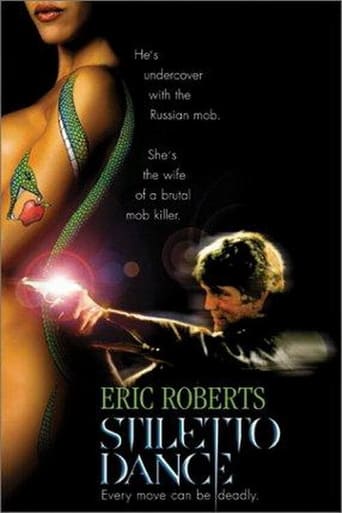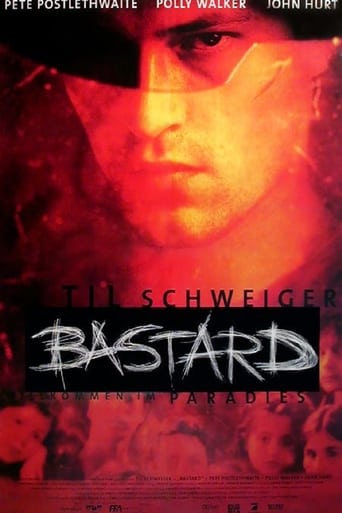I've Loved You So Long (2008)
A woman struggles to interact with her family and find her place in society after spending fifteen years in prison.
Watch Trailer
Cast


Similar titles
Reviews
Load of rubbish!!
This film is so real. It treats its characters with so much care and sensitivity.
This is one of the best movies I’ve seen in a very long time. You have to go and see this on the big screen.
Like the great film, it's made with a great deal of visible affection both in front of and behind the camera.
How does one return to family, friends and life in general after spending 15 years in prison? Are the people you remember still the same? Are you still the same to them? And how do you go about trying to rebuild your life? Il y a longtemps que je t'aime is a very thoughtful film on these very topics.Juliette (played with a subtle intensity by Kristin Scott Thomas) has just been released from prison and goes to live with her younger sister, Léa. We sense both warmth and distance between them when Léa picks her up from the airport. The film then focuses on slowly developing their bond and Juliette's troubles in navigating daily life which, of course, includes things like job applications and going out.The ways in which Juliette's relation to society is troubled by her history are incredibly varied: in many situations she feels it is best if she doesn't speak about it. When she does, however, she is either shown a look of disgust or ridiculed by a group of people who thinks she's joking. This is the main strength of the film: showing, in a slice-of-life manner, the many ways her past haunts the present as she tries to rebuild her life.This also brings us to what might be one of its (few) faults: pacing. The flow of the film is perfectly suited for its subject matter, but any 'slow' film also brings with it the risk of boring its audience. For me, this was not the case as I found the pace befitting the way Juliette has to cope with the world on a daily basis. Your mileage may vary.One last thing that got me thinking was the decision to go with the theme of a 'mercy killing', which must have made it easier for this film to work. It's the same with the TV-show Dexter which would be unwatchable if Dexter wasn't compelled by the Code of Harry to only kill criminals or those who 'deserve' it. At the same time I recognize that this wouldn't really have changed the nature of Il y a longtemps que je t'aime, since in both cases it would still be about a society highly unable to cope with someone like Juliette. What would change is the audience: I think it would be impossible for the audience to relate to Juliette had it not been a mercy killing. Speculation aside, this is a film all about the day-to-day interactions between Juliette and the people around her and how both parties cope with each other and if you're prepared for the purposefully slow tempo, then you'll most likely find it a very moving experience.
This film tells the story of a woman who is reunited with her sister after fifteen years in prison."I've Loved You So Long" starts off wooden and plain, as Juliette needs time to readjust to the life outside prison. Slowly, she warms up to her new environment, and people around her warm up to her. Initially we don't know why Juliette has been away for so long, we only find out as the story unfolds slowly. I really like the story telling in this film. The ending is great too, as it really exposes the pain of a mother who is consumed with guilt. She hopes for absolution, and the only way to do that is to go to prison.The story of "I've Loved You So Long" is very engaging. Kristin Scott Thomas gives a great performance too, and she literally look younger and more radiant as the film progress. I enjoyed watching this film.
Il y a longtemps que je t'aime. Juliette leaves prison after 15 years: received at the airport by her sister Lea, for a time as guest with her colors-of-Benetton-family. Slowly we learn what happened: a gesture, a look, a word here, a sentence there. But only in the last movie minute we are told what happened, a help to die. Who decides this gesture of termination: the Greek cliff of Tarpeia, the vikings look at the newborn, Martin Luther, Adolf Hitler or todays brain scanning of the unborn: "Rich prospective parents can already afford to have their unborn child's brain scanned for traces of possible future mental weakness"; S Zizeks 2010-345. A few people in the movie seem to 'understand' Juliette. But do not. One example is her probation officer, a victim of committed suicide. Does he sense her real reason of the murder, not told the why? The reason lies under Juliette's pillow: by chance of hurry falling onto the floor and picked up by the younger of the two adopted children: like this Lea gets to know the happened truth. Also the man of respect, Michel, does he really know, having teached prisoners, 'how it is': does he? Does grandfather Papy Paul, lost his speech of power: has silence a possibility of understanding? The most honest is the man, willing to give her the first work. But: "Get out of here", when she answers: "I killed my child". At the cheerful dinner party she is asked where she had been all the years: "In prison", responded with hysterical laughter of social sadism. As we do not know the truth until the last moment, we share Lucs, the fathers fear: will Juliette commit a second murder, one of the girls? The explaining end is for the sister and us an explanation but no answer. Has she permission and who gave her the permission to ease her and her sons pain with the help of death. In Juliettes case her son could not ask. Juliette: "The worst prison is the death of one's child. You never get out of it" She did not defend herself at the trial: sentenced for the 15 years. The German discussion after the hadamartime of 1945, when (again) was proposed this time for a 'begrenzte' Euthanasie (W Catel Nuernberg 1962) is a journey between Scylla and Charybdis. At its core it is an individual question of the voice of conscience. Wallis Simpsons grandmother advised: "Concience is like a mirror you must look into it at least once a day", quoted in the Edward Morrow 1965 television interview. As long we are able to contact this organ that helps not only to know but to know that we know. What has to change basically is our attitude (a good example of change on its way is Peace Corps. They search and practice at the core of themselves to renew the basic of humanity – beyond where they mirror themselves in those who are everything else but able, outcasts). But as long disability is a case of pity and false goodness and not a mirror for development for each other – the pity of the Juliettes never can be true interest. In gratitude Karl König 1902-166, a fighting for runner against the 'soft' death. Il y a longtemps que je t'aime.
I find it impossible to comment on this film without addressing the premise which underlies the entire story. Before I get to that, let me say that Kristin Scott Thomas and Elsa Zylberstein, the two principals, are excellent, and Phillippe Claudel's direction is superb. Kristin Scott Thomas for the first time in her long career (to my knowledge) is made to look very plain. If she is wearing any makeup at all, it is intended to downplay, rather than enhance, her considerable beauty. Zylberstein, whom I've never seen before, plays the much younger sister of Ms. Thomas's character, and she is lovely and lively in contrast to the general drabness and troubled countenance of her elder sister.Juliette Fontaine (Ms. Thomas) has just been released from 15 years in prison for the murder of her son and is taken into the household of her sister Lea (Ms. Zylberstein). It's relatively easy to guess the premise long before it is revealed: Juliette was a doctor who gave her young son a deadly injection to relieve his suffering from a painful and certain death. The part that's difficult -- I would say impossible -- to believe is that Juliette never spoke up during her trial to explain that it was a mercy killing and never told any member of her family or any friend why she killed her own child.The story only comes out because Lea accidentally discovers a picture of the child with a loving poem to his mother and a lab report which enables Lea, with the help of a doctor friend, to understand that the child was on the verge of death and in terrible pain. As I've said, I it strains credulity to imagine that Juliette would conceal the secret in court. But it defies belief that she would not tell her sister, who loves her, or her brother-in-law, who is decidedly nervous about having her in their house with their two adopted children. Despite this central flaw, "I've Loved You So Long," is well worth seeing. The cast is strong from top to bottom, and this is among Kristin Scott Thomas's most outstanding performances. The film is in French with English subtitles. For those who may not know it, Ms. Thomas, although English, has lived in France for many years. Still, early in the film, Lea apologizes for Juliette's "accent," explaining that she lived in England for a long time before the family returned to France.

